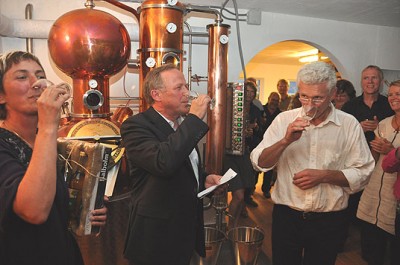Farmers’ attempts to sell their locally produced alcoholic beverages on site have set off another drinks debate in Norway, and threaten to divide one of the goverment’s coalition parties.

Agriculture Minister Lars Peder Brekk of the small, farmer-friendly Center Party has spent time this summer visiting several farms that want to generate new sources of income by selling, for example, alcoholic cider directly from their production sites. Brekk supports their efforts, as part of the government’s drive to open up new niche markets.
He said it was an “honor” to officially open such new ventures as the Agder Brenneri in Grimstad and Hoff Sundnes Brenneri at Inderøy and Ciderhuset in Balestrand, all distilleries making potent cider and brandies from Norwegian apples.
But he faces political opposition, not only from those who don’t want to see any exceptions made to the strict state monopoly (Vinmonopolet) that regulates sale of alcoholic beverages in Norway, but also from within his own party.
While Brekk was making the rounds of local distilleries, for example, his party’s spokesperson on health issues, Kjersti Toppe, was trying to crack down on Norwegians’ exposure to alcoholic beverages. In one of those “only in Norway” sorts of situations, Toppe even launched a public assault on the wine columns that long have been a standard feature in Norwegian newspapers.
Norway long has banned alcohol advertising and now Toppe wants to restrict journalists from writing about it as well. She thinks the columns that review wines or taste-test the quality of various brands of the Norwegian schnapps akevitt give alcohol too much publicity, and undermine the advertising ban.
Her proposal was dismissed, if not ridiculed, in most political sectors but presents a challenge for Brekk. It shows the power of the anti-alcohol lobby in Norway, which emerged again on Friday when the head of the anti-intoxicants group Actis wrote a column in newspaper Dagens Næringsliv (DN) blasting Brekk’s proposed cider house rules. Anne-Karin Kolstad wrote that protecting Vinmonopolet is far more important than allowing farmers to supplement their income with on-site sales. They can produce their cider, she allowed, and even apply to sell it by the glass, but bottled sales must be funneled through Vinmonopolet.
Brekk has his supporters, even in the opposition Liberal Party, and defends sales direct from the farm. “Norway is well-served with its restrictive alcohol policies,” he said. He just wants to make it easier for local producers to reach their markets.
“I want to see a multitude of Norwegian food and drink treasures,” he said. “The Norwegian raw ingredients contain the good flavours.”
And therein lies another irony. As columnist Kjetil B Alstadheim wrote in DN this week, Norwegian cider would fall into a category of “nice alcohol” that’s produced locally and sold out in the rural areas that Brekk’s party is always trying to support, while “naughty alcohol” comes from overseas and leads to drinking problems and hospitalization. Those producers would likely cry foul.
Views and News from Norway/Nina Berglund
Join our Forum if you’d like to comment on this story.

